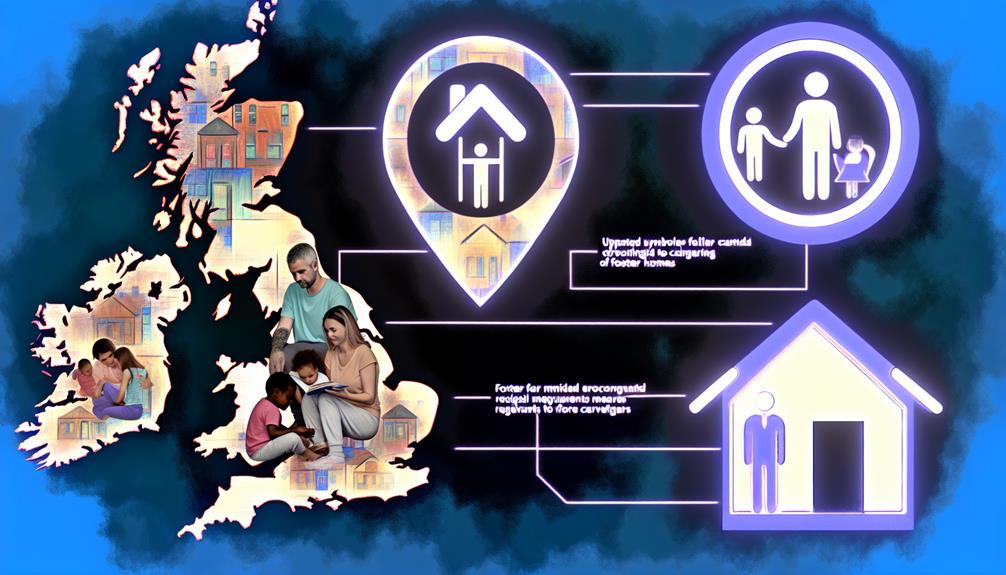Changes to UK's foster care regulations have been substantial lately. The age criteria for care has shifted to 21, affecting placements and associated legalities. Allocations methods for funding have been revamped, increasing transparency. Critically, foster parent eligibility now includes enhanced checks and targeted training. These modifications aim to provide better physical, emotional, and social support for foster children. More attention is being given to mental health support for carers, especially older ones. There are even advances in post-adoption assistance. To understand fully how these updates will affect your situation, further exploration is recommended.
Key Takeaways
- The age criteria for foster care has been extended to 21, impacting placements and legal complexities.
- Adjustments to funding policies include a new allocation method for transparency and efficiency.
- Regulatory changes emphasize mental health support for older carers and the importance of family needs.
- Eligibility criteria for foster parents now require enhanced criminal background checks and specific child care training.
- Adoption regulations have been adjusted to reduce barriers, streamline the process, and increase post-adoption support.
Understanding the UK Foster Care System

Delving into the complexities of the UK Foster Care System, it's crucial for you to comprehend its structure, function, and primary regulations, all of which collaborate to safeguard the welfare of children in need. This intricate system, often misunderstood and shrouded in foster care myths, is designed around legal safeguards to provide children with a safe, nurturing environment.
Firstly, let's debunk the myth that foster care is a last resort. In fact, it's a proactive measure to provide children in need with stable, temporary homes. This is where the system's structure comes into play. Local authorities are responsible for identifying children who can benefit from foster care, while independent agencies facilitate the matching process between children and foster parents.
Next, we turn to function, which is to provide physical, emotional, and social support. Importantly, foster care isn't a pathway to adoption; it's about providing temporary care while working towards family reunification wherever possible.
Lastly, the system is underpinned by stringent legal safeguards. These include rigorous screening processes, ongoing training for foster parents, and regular monitoring to make sure child safety. Understanding these aspects will help you navigate this system with confidence and clarity.
Shift in Age Criteria for Foster Care
Let's turn our attention to the recent shift in age criteria for foster care in the UK.
You'll find that the new age limit brings with it certain implications for those considering becoming foster carers.
We'll break down the changes for you, providing a clear, analytical view of how these new regulations may impact potential carers.
New Age Limit Explained
In understanding the recent changes in UK's foster care regulations, you'll find that the shift in the age criteria plays a significant role, broadening the scope of who can be considered for foster care. Previously, the upper age limit was 18, but now it's been adjusted to 21. This shift has been met with a mix of Age Limit Critiques and Legal Implications.
Here's a brief snapshot:
| Previous Upper Age Limit | New Upper Age Limit | Implications |
|---|---|---|
| 18 | 21 | Broadens the eligibility pool for foster care, which may lead to more placements and potential legal complexities |
This change may impact the overall landscape of foster care in the UK, posing new opportunities and challenges.
Implications for Potential Carers
As we explore the ripple effects of the age criteria shift in foster care, it's important for potential carers to understand how this change could impact them. Primarily, it can alter the dynamics of your support networks, given that older carers may have different needs compared to younger ones.
The change could also impact a carer's mental health. Older carers might find it more challenging to manage stress and maintain resilience due to the demands of caring for a child. It's critical to have extensive support networks to mitigate these challenges.
This shift underscores the need for thorough mental health support for carers, ensuring they're adequately equipped to handle the unique challenges presented by the new age criteria.
Changes in Foster Care Funding Policies

You'll find that recent changes in foster care funding policies have introduced new allocation methods that directly impact foster families.
It's important to dissect how these financial shifts may upset the balance in the foster care system.
Let's begin by exploring the nature of these funding changes and then move on to their implications on foster families.
New Funding Allocation Methods
Changes in funding policies have introduced new allocation methods that directly impact the UK's foster care system. These methods, aimed at enhancing funding transparency and resource allocation, are transforming the way funds are distributed.
You'll observe that the old, opaque system is being replaced by one that's more clear and equitable. It's a move designed to guarantee that every pound is used where it's needed most.
The core of the new funding allocation method is a formula-based system. This system takes into account factors such as the number of children in care and the specific needs of each child. The aim? To distribute resources more efficiently and improve outcomes for children in foster care. It's a promising step towards a more equitable foster care system.
Impact on Foster Families
While the new funding allocation methods promise a more equitable distribution of resources, it's important to explore their direct effects on foster families. The changes in funding policies can alter family dynamics in a meaningful way, putting new pressures on existing structures.
You might experience an emotional impact, as the shift in resources could lead to uncertainty and stress. This can be particularly pronounced if the financial adjustments don't align with your family's unique needs. It's essential to ponder these aspects when exploring the new landscape of foster care funding.
Amendments in Foster Parent Eligibility
In light of recent amendments, the eligibility criteria for prospective foster parents in the UK have undergone significant transformation, necessitating a detailed analysis of these regulatory changes. These alterations pertain to two vital aspects: health requirements and criminal background checks.
- Health requirements: You're now required to demonstrate your physical and mental ability to care for a child. This implies undergoing health assessments to ascertain your fitness level. It's not just about being illness-free but also having the emotional capacity to meet a child's needs.
- Criminal background checks: You can't evade the enhanced Disclosure and Barring Service (DBS) checks anymore. These checks are more rigorous and thorough. A history of violence, abuse, or any offence against children will disqualify you outright.
- Training: Mandatory training on child care, behaviour management and safeguarding is now the norm. You're expected to have a good understanding and practical skills to handle the challenges of fostering.
- Financial stability: While you don't need to be rich, you must prove your financial stability. The child's needs should be met without undue financial strain.
These changes aim to make sure that every child in foster care is provided with a secure, supportive and nurturing environment.
Impact of New Regulations on Children

Given these new regulations, it's imperative to contemplate how they directly impact the children placed in foster care, ensuring their safety, security, and overall wellbeing. The new rules enhance regulation compliance, which is important for maintaining the highest standards of care. This compliance isn't solely about ticking boxes; it's about building environments where children feel secure, leading to better emotional health.
The emotional implications of these regulations can't be overstated. They're designed to minimize disruptions in the children's lives, thereby reducing trauma and enhancing emotional resilience. For instance, the new rules prioritize placing siblings together, recognizing the emotional stability this can provide to children in care.
Under the new regulations, children's voices are also given more weight in decisions affecting them. This empowerment can lead to better self-esteem and confidence, essential for their overall development.
Additionally, the regulations ensure children receive regular reviews of their care, which provides opportunities for continuous improvement. They strengthen safeguards, making certain that children's rights are upheld in the foster care system.
Indeed, the impact of these new regulations is far-reaching, affecting not only the children's present situation but also their future wellbeing.
Modifications in Foster Care Training
Reflecting the changes in the regulations, foster care training has undergone significant modifications, aiming to equip caregivers with improved skills and knowledge to offer the highest level of care to children. These modifications are centered around an enhanced training program and a robust support system.
- Training Enhancement: The training now incorporates a rigorous and detailed curriculum. You're expected to gain a profound understanding of a child's needs and how to cater to them effectively.
- Support System: It's not just about training; you'll be enveloped within a thorough support system. You'll have access to experienced counsellors and expert advice, guiding you in your journey.
- Specialized Training: In response to the diverse needs of children, specialised training modules are now available. So, you can specialise in areas such as trauma care, behavioural challenges, or special educational needs.
- Continued Learning: You won't stop learning after the initial training. Regular refresher courses are planned to keep your skills and knowledge up-to-date.
In essence, these modifications aim to make sure that you, as a foster carer, are fully equipped to provide the highest level of care and are never left to navigate the complexities of foster care alone.
Adoption: Recent Regulatory Adjustments

Just as foster care has seen significant updates, so too has the domain of adoption undergone notable regulatory adjustments in the UK recently. These changes are largely focused on reducing adoption barriers and enhancing post-adoption support.
Adoption barriers have been a longstanding issue in the UK. That's why recent regulations have been introduced to streamline the process. You'll see changes like reduced bureaucracy and more flexible eligibility criteria. These are aimed at making the adoption process less cumbersome for potential adoptive parents. It's a big step towards making adoption more accessible to a wider demographic.
Post-adoption support has also been a focal point of regulatory changes. You may have heard about the increased funding for post-adoption services. This is a direct response to the needs of adoptive families who often require support to help their new family member adjust. You'll also find specific measures aimed at tackling issues like attachment disorders and traumas often associated with adopted children.
In essence, these regulatory adjustments are designed to make adoption a more viable choice for more people, while ensuring that the necessary support structures are in place to help families thrive post-adoption.
Future Prospects: UK Foster Care Policies
Looking ahead, it's evident that the UK's foster care policies are set for more transformative changes, all aimed at enhancing the lives of children and foster families alike. In the face of foster care challenges, there's a laser-focused determination to improve the policy impact.
Here are four significant future prospects:
- Enhanced Training: There's a drive toward better training for foster parents. This is to guarantee they're equipped with the necessary skills to handle the unique challenges presented by foster care.
- Improved Support Services: There'll be an increased focus on support services for foster families. The aim is to provide emotional, financial, and psychological support to foster families, helping them navigate the complexities of the foster care system.
- Legislative Revisions: The UK government is keen on revising existing legislation to make it more beneficial for children under foster care. The focus will be on ensuring their rights, safety, and welfare.
- Increased Funding: Lastly, more funds will be allocated to the foster care system. This move will provide better resources for foster families, leading to improved living conditions for children.
As we move forward, these changes promise to bolster the UK's foster care system, marking a progressive shift in policies and their impact.
Frequently Asked Questions
What Are the Mental Health Support Systems Available for Foster Children in the Uk?
In the UK, you'll find mental health support for foster children through therapeutic interventions and educational support. This includes therapy sessions, counselling, and special educational programmes tailored to a child's specific needs.
How Has the COVID-19 Pandemic Affected the Foster Care System in the Uk?
The pandemic's challenges have greatly impacted you. Remote schooling's been a struggle for foster kids in the UK, with many lacking necessary resources. Care systems are burdened, making it harder to address kids' needs effectively.
Are There Any Recent Updates in the Regulations Regarding the Rights of Biological Parents in the UK Foster Care System?
Yes, there've been changes in Parental Visitation Rights and Dependency Court Proceedings. These updates aim to balance the rights of biological parents with the best interests of children in the UK foster care system.
What Are the Regulations in Place for Lgbtq+ Individuals Wanting to Become Foster Parents in the Uk?
In the UK, you'll find no adoption barriers for LGBTQ+ individuals becoming foster parents. Inclusive training is provided, ensuring all potential foster parents understand and can meet the needs of foster children.
How Does the UK Foster Care System Deal With Children From Different Cultural and Religious Backgrounds?
In the UK, you'll find cultural sensitivity training mandatory for foster parents. This guarantees diverse placement strategies for children from various backgrounds, promoting a respectful, inclusive environment for all foster children.
Conclusion
You've navigated the recent updates in the UK's foster care system, understanding the shifts in age criteria, funding policies, and parent eligibility.
You've seen the impact on children and the changes in training and adoption regulations.
Together, we've analysed these modifications and their future prospects.
These aren't just rules and regulations – they're steps towards improving lives, securing futures and ensuring every child in the UK foster care system has a chance for a brighter tomorrow.




